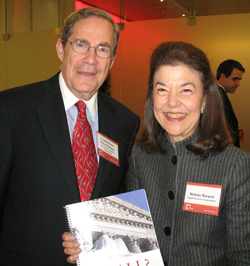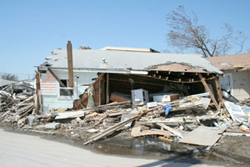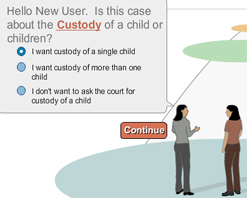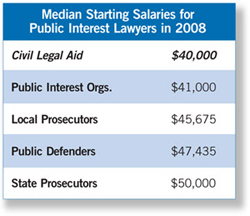LSC News
Continuing Resolution Keeps LSC at Current Funding Levels until March
LSC will continue to operate at fiscal year 2008 funding levels until March 6, 2009, or until LSC's regular FY 2009 appropriation is enacted, according to the continuing appropriations resolution (H.R. 2638) passed by Congress and signed into law by President Bush on September 30. The resolution was necessary to prevent the shutdown of the federal government, since Congress had not passed any of the 12 annual spending bills before FY 2009 started on October 1. LSC received $350.5 million in FY 2008, but is still looking forward to the possibility of an 11 percent increase for 2009, as the appropriations committees in the House and Senate have recommended $390 million for LSC. However, Congress is not expected to revisit the appropriations process until next year.
back to top ^
New Report Details Unmet Civil Legal Needs of D.C.'s Poor

LSC President Helaine M. Barnett and D.C. Access to Justice Commission Chairman Peter B. Edelman hold a copy of the report.
LSC President Helaine M. Barnett joined top officials from all three branches of Washington, D.C.'s government to celebrate the release of a new report from the city's Access to Justice Commission detailing the unmet civil legal needs of the poor in our nation's capital. Mayor Adrian M. Fenty, City Council Chairman Vincent C. Gray, D.C. Superior Court Chief Judge Lee Satterfield, D.C. Court of Appeals Chief Judge Eric Washington, as well as D.C. Bar President Robert J. Spagnoletti and Commission Chairman Peter B. Edelman, all highlighted the critical importance of the new report, Justice for All?: An Examination of the Civil Legal Needs of the District of Columbia's Low-Income Community, at an event sponsored by the law firm of DLA Piper on Oct. 7. The firm took a lead role in preparing the report by appointing numerous partners, associates, and support staff to research and draft the report pro bono.
The report combines hard data from legal aid providers and the courts with valuable insight from government agencies and community-based organizations to present a comprehensive assessment of the civil legal needs of the city's poor, the need for dramatically increased resources to address them, and strategies to secure those resources. Among the report's findings are that more than 95 percent of parties in domestic violence and landlord/tenant cases are unrepresented by an attorney, physical and mental disabilities and limited English proficiency often create additional challenges to seeking justice, the poor are often unaware of their legal rights and lack knowledge regarding the availability of legal aid.
"All of us at the Legal Services Corporation salute the hard work by the D.C. Access to Justice Commission and DLA Piper in conducting this comprehensive study and shining a spotlight on the unmet civil legal needs of the District of Columbia's low-income communities and the devastating consequences of unaddressed civil legal matters," said Barnett.
Click here for more information. ( 37k) 37k)
back to top ^
LSC Hosts National Foreclosure Conference Call
The foreclosure crisis is having a devastating impact on many individuals and families in low-income communities and more and more organizations are working to deal with this crisis. In an effort to identify opportunities for collaboration, LSC sponsored a conference call to discuss legal aid and equal justice initiatives to address the foreclosure crisis.
Participants on the September 18 teleconference said demand for legal services is growing and that some organizations lack an adequate number of attorneys to handle their increased foreclosure workload and are reaching out to the private bar for pro bono help. Some participants also expressed concern about how they will be able to sustain their foreclosure projects if grants and other funds fall short in coming years.
Sixteen organizations joined in the teleconference, including representatives of the Center for Responsible Lending, National Association of Consumer Advocates, National Consumer Law Center, National Legal Aid and Defender Association, and the Sargent Shriver National Center on Poverty Law. LSC-funded programs in Atlanta, Brooklyn, Chicago, Cleveland and Columbus, OH, and Memphis and Jackson, Tenn., also participated on the call.
LSC President Barnett and two LSC officials, Karen Sarjeant and Michael Genz, represented the Corporation on the conference call.
Participants agreed to conduct quarterly conference calls in the future to keep abreast of developments. In the interim, LSC will assemble foreclosure-related training materials, community legal information and other documents the participants have created and make them available to legal aid programs involved in foreclosure work.
back to top ^
LSC Awards $2.27 Million in Technology Grants
LSC has awarded 33 technology grants totaling $2.27 million to LSC programs in 21 states, LSC President Helaine M. Barnett announced on September 19.
The grants will be used for technology that makes it easier for low-income Americans to apply for legal assistance, simplifies the creation of legal documents for those who are representing themselves in court and provides information through online chats, called LiveHelp. One LSC-funded program will use its grant to redesign portions of a Web site to make the content available via cell phone browsers.
"LSC is constantly exploring ways to use technology to expand access to justice, by making self-help systems more available and by improving the efficiencies of LSC-funded programs to serve more low-income Americans," Helaine Barnett said. "These grants will go a long way toward improving the services that our programs provide low-income individuals and families."
Click here for the full release.
back to top ^
Legal Aid Offices to Help Victims of Ike and Gustav

An example of the wreckage caused by Hurricane Ike in Galveston, Texas. Photo by Britney Jackson of Lone Star Legal Aid.
Texas and Louisiana programs funded by the Legal Services Corporation have launched efforts to ensure civil legal aid is available to persons displaced or affected by hurricanes Ike and Gustav.
In Texas, Lone Star Legal Aid has started mobilizing two-person legal teams to work at local shelters and provide assistance. All of the 29 Texas counties declared federal disaster areas are in the program's service area.
Ike slammed into Texas on Sept. 12, causing flooding, property damage and widespread power outages from the coast through the Houston area, and knocked out the Galveston and Beaumont offices of Lone Star Legal Aid. Gustav roared across Louisiana on Sept. 1, and walloped the four LSC-funded programs in the state; the western region of the state also got hit by Ike. But program officials in Texas and Louisiana moved quickly to reroute services and resume operations.
"The Texas and Louisiana programs are resilient and resourceful, and we applaud their dedication," LSC President Helaine M. Barnett said. "Ensuring that low-income individuals and families are able to obtain legal assistance, especially following a significant natural disaster, is a critical part of the nation's disaster recovery response."
Click here for the full release.
back to top ^
Field News
Financial Crisis Crippling Legal Aid for Poor
Matt Katz, Philadelphia Inquirer – September 27, 2008
The nation's financial crisis is claiming two more victims: Poor people who need legal help, and their attorneys.
Programs that provide free legal representation to the indigent are partly funded through interest on accounts for real estate transactions, legal aid groups say. As the housing market collapsed this year and interest rates dropped, funds disappeared.
The problem stretches nationwide, but this area has been hit particularly hard, say representatives of local and national legal aid organizations. Thousands of people across the region won't have the same access to legal protection for foreclosure, eviction, domestic violence, divorce, school-related conflicts and problems with disability benefits.
South Jersey Legal Services, which covers seven counties, will lay off five attorneys and close two offices beginning in January. It expects to provide legal help to 9,000 people next year, down from 12,000 this year.
Click here for the full article.
back to top ^
Los Angeles Legal Aid Expands Homeless Veterans Project
The Legal Aid Foundation of Los Angeles (LAFLA) has expanded its Bill Smith Homeless Veterans Project to address the increased demand for its services at a time when many veterans are returning from the wars in the Middle East. The Project, which is part of LAFLA's legal work in Government Benefits law, was previously located in downtown Los Angeles, but has moved to LAFLA's offices in Long Beach and East Los Angeles.
"Our goal is to protect veterans and their families by securing government benefits, medical care and services, while stabilizing their living situation," explained Rick Little, project director and VA Accredited Claims Agent. "Many veterans find it difficult to navigate the complex bureaucracy of the VA Department, and as a result, end up on the streets."
The Project helps veterans with many critical services including filing claims for compensation or pension from the VA. Claims are filed on behalf of indigent veterans suffering from service-connected disabilities such as Post Traumatic Stress Disorder, Agent Orange related disabilities, and/or disabilities suffered from returning veterans from the Persian Gulf War. The Project also helps family members of living or deceased veterans apply for VA benefits.
Click here for more information.
back to top ^
Maryland Legal Aid Web Tools Simplify Child Custody Procedures
 Two Web sites developed by the Maryland Legal Aid Bureau are making it easier for pro se parents and family law attorneys to fill out and file properly formatted court forms for child custody proceedings. Parents without attorneys can access the Child Custody and Visitation Interview at www.peoples-law.org, which guides parents through a simple series of questions resulting in a printable court form that he or she can sign and file with the court. Attorneys handling custody matters can log on to www.mdjustice.org to access a tool allowing them to interview clients and enter their answers into the correct court forms that the attorneys can then print and have the client sign. Both sites were developed in part with funding from the Legal Services Corporation's Technology Initiative Grants program. Two Web sites developed by the Maryland Legal Aid Bureau are making it easier for pro se parents and family law attorneys to fill out and file properly formatted court forms for child custody proceedings. Parents without attorneys can access the Child Custody and Visitation Interview at www.peoples-law.org, which guides parents through a simple series of questions resulting in a printable court form that he or she can sign and file with the court. Attorneys handling custody matters can log on to www.mdjustice.org to access a tool allowing them to interview clients and enter their answers into the correct court forms that the attorneys can then print and have the client sign. Both sites were developed in part with funding from the Legal Services Corporation's Technology Initiative Grants program.
back to top ^
Legal Aid of Nebraska Seeks Executive Director
Legal Aid of Nebraska is seeking an executive director to replace Douglas K. German, who announced that he will retire from the program around the end of the year. German has spent the last eight years at the helm of the organization-the state's largest legal aid program. "I feel I've completed the task of merging the three former legal aid programs into one effective statewide legal aid firm," said German. "Legal Aid of Nebraska is enjoying unprecedented success and is in a very good position to transition to a new executive director." Some responsibilities of the new leader will include providing a new long-term vision for the firm, implementing a strategic plan developed in response to findings from the program's 2006 legal needs assessment, serving as the public voice of the program and the state's low-income communities, and seeking new resources to support the work of the program.
Click here for more information. ( 48k) 48k)
back to top ^
Civil Legal Aid Lawyers Still the Lowest-Paid in Legal Profession
 The National Association for Law Placement (NALP) has released its 2008 Public Sector and Public Interest Attorney Salary Report, which provides salary information for both entry-level and experienced attorneys at public sector and public interest organizations. The report shows that while the median salaries for civil legal aid lawyers have been steadily increasing in recent years, they are still the lowest in the legal profession-less than the salaries for public defenders, state and local prosecutors, and lawyers at other public interest organizations. An entry-level attorney at a civil legal aid program could expect to make around $40,000 a year, compared with $47,000 as a public defender or $50,000 as a state prosecutor. The situation does not improve with time either, according to the report. Legal aid lawyers with 11 to 15 years of experience can expect to earn a median salary of merely $60,000, less than the salary of a first-year attorney at a small private firm. The National Association for Law Placement (NALP) has released its 2008 Public Sector and Public Interest Attorney Salary Report, which provides salary information for both entry-level and experienced attorneys at public sector and public interest organizations. The report shows that while the median salaries for civil legal aid lawyers have been steadily increasing in recent years, they are still the lowest in the legal profession-less than the salaries for public defenders, state and local prosecutors, and lawyers at other public interest organizations. An entry-level attorney at a civil legal aid program could expect to make around $40,000 a year, compared with $47,000 as a public defender or $50,000 as a state prosecutor. The situation does not improve with time either, according to the report. Legal aid lawyers with 11 to 15 years of experience can expect to earn a median salary of merely $60,000, less than the salary of a first-year attorney at a small private firm.
Click here for more information.
back to top ^
New Tool for "Street Lawyers" Fighting Homelessness
 The National Law Center on Homelessness and Poverty, in partnership with 20 state and local organizations, has launched a new Wiki to help advocates, attorneys, policy makers and homeless people collaborate to fight homelessness. The new site, Street Lawyer: Legal Tools for Economic Justice, seeks to be the nationwide clearinghouse for legal resources related to the issue and the central location where experts can work together on projects and initiatives. The Wiki includes an advocacy manual consisting of fact sheets, Q&A, statutory materials, litigation documents, model programs, policies and legislation, and in-depth articles. NLCHP will provide an orientation to the site on October 15, 2008 for current and potential Wiki partners. The National Law Center on Homelessness and Poverty, in partnership with 20 state and local organizations, has launched a new Wiki to help advocates, attorneys, policy makers and homeless people collaborate to fight homelessness. The new site, Street Lawyer: Legal Tools for Economic Justice, seeks to be the nationwide clearinghouse for legal resources related to the issue and the central location where experts can work together on projects and initiatives. The Wiki includes an advocacy manual consisting of fact sheets, Q&A, statutory materials, litigation documents, model programs, policies and legislation, and in-depth articles. NLCHP will provide an orientation to the site on October 15, 2008 for current and potential Wiki partners.
Click here for more information, including a link to the Wiki.
back to top ^
NTAP Training on PowerPoint
 The Legal Services National Technology Assistance Project, or NTAP, is hosting a free online training session for legal aid leaders and staff on the use of Microsoft PowerPoint on Friday, October 17. The session is designed for intermediate users familiar with the program's basics and will focus on five to ten special tools and features that can make the program easier to use and can make your presentations "pop." The Legal Services National Technology Assistance Project, or NTAP, is hosting a free online training session for legal aid leaders and staff on the use of Microsoft PowerPoint on Friday, October 17. The session is designed for intermediate users familiar with the program's basics and will focus on five to ten special tools and features that can make the program easier to use and can make your presentations "pop."
Click here for more information.
back to top ^
What's New on LSC Resource Information
The LSC Resource Information (LRI) is an online clearinghouse of best practices, model projects, and other resources for LSC-funded programs.
Virginia Legal Aid Society's Food Stamp Application Module
The Lynchburg-based Virginia Legal Aid Society has created a computerized food stamp application program that allows legal aid staff to quickly and easily register eligible clients to receive the valuable public benefit. In the space of five minutes, an intake worker can collect the appropriate information for the application and submit it to the state department of social services. The technology will begin operation in 2008 in Virginia and will be available free to any legal aid program across the country.
Click here to learn more about the project.
back to top ^
Success Story from Legal Services of Northern California
Legal aid is about helping ordinary people with real-life problems. Client stories illustrate the day-to-day struggles-and victories-of poor Americans seeking justice under law.
Legal Aid Fixes Bureaucratic Error, Secures Housing Assistance
Stephanie has numerous physical and psychological disabilities and cannot read. She is in constant physical pain, has difficulty communicating with others, and becomes extremely frustrated when she is under stress or unable to make herself understood. She is an SSI recipient with a relative acting as her payee. Although she has lived in Vallejo for many years, Stephanie's SSI checks are sent to her payee's address in another city.
After being on the city of Vallejo Section 8 waiting list for many years, Stephanie's name was finally called. After Stephanie submitted her paperwork, the housing authority informed her that she would not get a voucher because they had determined that she was not a resident of Vallejo. The housing authority pointed to the fact that Stephanie's SSI checks were being sent to a non-Vallejo address. Stephanie was told that as she was not entitled to the residency preference, she would be placed at the bottom of the waiting list.
Stephanie repeatedly tried to explain that although her SSI checks went to a non-Vallejo address, she had lived in Vallejo for many years. The housing authority refused to speak to Stephanie's payee when he tried to assist Stephanie. Stephanie tried to submit old medical records and mail showing a Vallejo address, but the housing authority refused to accept these documents. The housing authority told her that their decision was final.
Stephanie was distraught at the prospect of never getting a Section 8 voucher. She made many calls to the housing authority trying to contact a supervisor and left several voicemail messages. The housing authority eventually wrote Stephanie a letter stating that she was being removed from the waiting list. Stephanie requested an informal hearing and had her relative-payee assist her at the hearing. The hearing officer ruled against Stephanie, and upheld her removal from the waiting list.
Stephanie contacted our office and we wrote a lengthy reasonable accommodation request. In the letter, we requested that the housing authority rescind its decision denying Section 8 assistance to Stephanie and return her to the waiting list. We also requested that the housing authority take the following steps to improve communication with Stephanie: 1) allow Stephanie to select a representative to assist her in future communications with the housing authority; 2) require employees to verbally explain any written notices of action to Stephanie; 3) require employees to communicate with Stephanie and her representative in private; and 4) assign a different worker to assist Stephanie and her representative.
The housing authority granted all of the requested accommodations and told Stephanie that she will be assigned a new worker once she is issued a voucher.
We advised Stephanie and her payee about what sort of documents to submit to the housing authority to prove residency. The housing authority accepted those documents and informed Stephanie that she should be getting a Section 8 voucher in October.
Note: This story originally appeared in the Legal Services of Northern California's Fall 2008 newsletter. Click here to download the full newsletter. ( 1.6mb) 1.6mb)
back to top ^
|